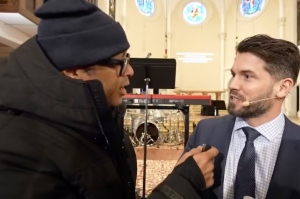What is revival? A guide for Gen Z

Last week I received an email from Zoe, one of our newer and younger team members here at Dare 2 Share. She wanted to know about the Asbury Revival. Actually, she wanted to know about “revival” in general. Here’s the e-mail she sent me:
"Hey, you should write a blog defining ‘revival.’ Most of the discourse I’ve seen online is debating whether this is a revival, and it seems that most everyone has a different definition. It might also be helpful for people around my age group (25 and younger), who have never seen or experienced a revival firsthand. I think there is a generational gap between people who have seen ‘revival’ and those of us who have no personal experience with this sort of movement or concept. Personally, the word revival doesn’t mean anything to me — it seems like a fictional term. It feels like a term older Christians use for whatever they see fit."
I think Zoe is right.
Revival in the rearview mirror
Those of us who are older are probably much more familiar with the terms “revival” and “awakening” than the younger generation. I’m so old (although I prefer the word “classic” or “vintage”) that I remember the tail end of the Jesus Movement and all of the Jesus-loving, bell-bottom-wearing hippies of the early 70s!
But I’m also somewhat familiar with revival on a personal level. I saw a version of it sweep through my violent, inner-city, bodybuilding, fist-throwing family and completely transform them from street fighters into street preachers. I began studying the whole subject of revival in my middle school years and have continued ever since.
Books about revival and awakening have always been on my reading list. One of my favorites is called George Whitefield: The life and times of the great evangelist of the 18th-century revival by Arnold Dallimore. This two-volume, 1,200-page tome is a deep dive into the good, bad, and ugly of the First Great Awakening.
For instance, did you know that the two primary evangelists, George Whitefield and John Wesley, were “frenemies” for most of their ministry careers? Whitefield, a full-on Calvinist (God chose us), and Wesley, an all-out Arminian (we choose God), started as friends and ended as friends, but for the bulk of their ministries, there was a whole bunch of tension between these two men of God.
Rumors were started, letters were written, sides were taken, and feelings were hurt. But in spite of “the bad and the ugly,” there was still so much good. Unbelievers were evangelized, churches were energized, and communities were Gospelized.
And, yes, there were extremes at times. This has been the case with almost every major spiritual awakening in the history of the church.
Both Wesley and Whitefield had to learn how to deal with the excesses and extremes of those who would show up to their services and demonstrate some rather weird behavior. Some believed that these excesses were of God, and others believed they were of the devil.
Theologians argued, tempers flared, and accusations flew.
Sound familiar?
But these excesses didn’t negate the awakening that was taking place. Yes, they had to be dealt with, but they didn’t derail God’s plan to transform a soon-to-be-nation for God!
Revival "in the main"
Reporter Chip Hutcheson, in an article in Kentucky Today, shared some great insights from Tim Beougher, pastor of West Broadway Baptist Church in Louisville and evangelism professor at The Southern Baptist Theological Seminary. Pastor Beougher is an expert on revival and gave this advice regarding Asbury after visiting there and seeing firsthand what was happening:
"Throughout the history of revivals, critics have pointed to some type of ‘excess’ accompanying a revival and tried to argue that ‘excess’ discredited the entire revival moment and meant it wasn’t truly a work of God. Jonathan Edwards answered that criticism during the First Great Awakening by using a helpful phrase: ‘in the main.’ What is at the heart of the movement? What is happening ‘in the main’? There will always be ‘excess’ on the fringe, due to overly excited and not yet completely sanctified human beings and/or to Satanic opposition, but what is taking place ‘in the main’? That is a helpful grid to evaluate movements like that taking place now at Asbury."
We don’t want to let the extremes of revivals past or present distract us from the mainstream of what God is doing. We must focus on what is happening “in the main.”
In spite of some of its excesses and extremes, there is no doubt that God used the First Great Awakening to vastly increase the spiritual temperature in the colonies and morally prepare the disjoined American colonies to eventually become the United States of America.
Although I haven’t personally been to Asbury University to experience it for myself, I have some very good friends who have. All of them have told me that it was, for the most part, low-key, extremely focused on Jesus, and, for the most part, un-orchestrated and student-led. There has been confession of sin, faith indications, surrender to Christ, and lots and lots of prayer and worship.
Revival defined
But to get back to Zoe’s question: What is revival?
John Piper defined revival this way:
"In the history of the church, the term revival in its most biblical sense has meant a sovereign work of God in which the whole region of many churches, many Christians has been lifted out of spiritual indifference and worldliness into conviction of sin, earnest desires for more of Christ and his word, boldness in witness, purity of life, lots of conversions, joyful worship, renewed commitment to missions. You feel God has moved here. And basically revival, then, is God doing among many Christians at the same time or in the same region, usually, what he is doing all the time in individual Christian’s lives as people get saved and individually renewed around the world."
That’s a great definition.
Here’s something interesting: The word “revival” is never mentioned in the New Testament — not even once. Maybe it’s because what we call “revival” God calls Standard Operating Procedure.
But although the word revival is not mentioned in the New Testament, we see the concept again and again.
- We see it in Acts 2, when the Holy Spirit set the believers’ tongues on fire and 3,000 were added to their number that day.
- We see it in Acts 4:31, when the power of prayer shook the building, the power of the Spirit shook the believers, and then the power of the Gospel shook the city.
- We see it in Acts 19:17-20, after a demon-possessed man beat the tar out of the seven sons of Sceva who misused the name of the Jesus to try to cast a demon out. As a result:
"… when this became known to the Jews and Greeks living in Ephesus, they were all seized with fear, and the name of the Lord Jesus was held in high honor. Many of those who believed now came and openly confessed what they had done. A number who had practiced sorcery brought their scrolls together and burned them publicly. When they calculated the value of the scrolls, the total came to fifty thousand drachmas. In this way the Word of the Lord spread widely and grew in power."
After this demon-possessed man went Old Testament on these seven unsaved guys who thought they could just flippantly use the name of Jesus to cast a demon out, the Ephesian believers were convicted of their own sins and took radical action.
Many of these early believers had been secretly keeping sorcery and magic scrolls hidden away in their closets. But now, convinced and convicted of their sins, they decided to have a scroll-burning party. They collectively ran back to their homes, grabbed all their sorcery scrolls from their old way of life, and ran back to their fellow believers to spark a holy bonfire.
The flames of those burning scrolls, worth millions of dollars in today’s money by the way, were not nearly as high or hot as the fire for God that had been kindled in their souls. These newly revived Ephesian Christians turned their backs completely on their old way of life and fully embraced Christ as, not just their Savior, but also as their King.
What was the result? The Gospel spread farther faster. In the words of Luke:
"In this way the Word of the Lord spread widely and grew in power" (Acts 19:20).
I would call that revival. Wouldn’t you? It started when they upwardly held the name of Jesus “in high honor” and continued when they inwardly rid themselves of their secret sins and outwardly spread the Gospel to everyone around them.
Forty years later, we see another example of what this upward, inward, outward revival should look like. And guess what? It’s once again with the Ephesian believers!
Jesus wrote these words to the church of Ephesus through the pen of the apostle John:
"To the angel of the church in Ephesus write: These are the words of Him who holds the seven stars in his right hand and walks among the seven golden lampstands. I know your deeds, your hard work, and your perseverance. I know that you cannot tolerate wicked people, that you have tested those who claim to be apostles but are not, and have found them false. You have persevered and have endured hardships for my name, and have not grown weary. Yet I hold this against you: You have forsaken the love you had at first. Consider how far you have fallen! Repent, and do the things you did at first. If you do not repent, I will come to you and remove your lampstand from its place" (Revelation 2:1-5).
In this passage, we see that the Ephesian church, which was once alive and on fire for God, needed a revival once again. Jesus calls them to an upward fixation on Him, an inward consecration of self, and an outward activation for the Gospel.
Upward fixation on Jesus
The Ephesian believers had "forsaken the love" they had at first. One translation puts it this way: "You have left your first love."
What is our first love? It’s not evangelism or revival or ministry or even the church. Our first love is Jesus.
Revival starts with an upward fixation on Jesus. He’s the epicenter and apex of every true spiritual awakening.
From every report I’m getting from Asbury University, it seem there’s a collective fixation on Christ. The music being sung, the Scriptures being read, and the prayers being prayed have Jesus as their centerpiece and His glory as their masterpiece.
Because of this collective fixation on Jesus, many of these young believers are heeding the call of Jesus to the church at Ephesus in Revelation 2. Some are coming to Him for the first time in faith and receiving His free gift of salvation, based on Christ’s death, burial, and resurrection. Others are coming back to Him as their "first love" and allowing Him to reign supreme in every area of their lives.
The first sign of true revival is that there’s an upward fixation on Christ. The second is that there’s an …
Inward consecration of self
According to vocabulary.com, consecration "is the act of dedicating something to God, sanctifying it and making it holy." It is a separation from sin and a setting apart to God.
Jesus calls the Ephesian believers to "consider how far you have fallen" and to "repent." Just as it had been 40 years earlier, before the scroll-burning incident, there were new sins hidden in their closets that needed to go up in a blaze.
These believers needed to remember and return. These believers needed to consecrate themselves to God.
So do we.
A key part of consecration is engaging in the process of identifying and crucifying our secret sins so we can be wholly devoted to Christ.
2 Timothy 2:19-21 says it like this:
"Everyone who confesses the name of the Lord must turn away from wickedness.’ In a large house there are articles not only of gold and silver, but also of wood and clay; some are for special purposes and some for common use. Those who cleanse themselves from the latter will be instruments for special purposes, made holy, useful to the Master, and prepared to do any good work."
God will serve revival only on clean plates.
That’s why I was so excited to hear that confession of secret sins and public declaration of whole-hearted commitment to Christ are central to what has been taking place at Asbury University.
The inward work of consecration must begin in our hearts first, before it can spill over into true revival.
I’m reminded of the words of late evangelist Gypsy Smith, who was asked by a younger preacher how to start a revival at his church. He told the young pastor:
Find a piece of chalk and find an empty room. Go into that room and shut the door. Draw a circle on the floor with that chalk, kneel down in that circle, and ask God to start revival right there.
For revival to start, there must be an upward fixation on Jesus, an inward consecration of self, and finally an …
Outward activation for the Gospel
Jesus wrote these stinging words to the church of Ephesus:
"Yet I hold this against you: You have forsaken the love you had at first. Consider how far you have fallen! Repent and do the things you did at first" (Revelation 2:4-5).
Notice the last phrase: "Do the things you did at first." What were these things? Was it 24-hour praise and worship? Was it just confession of sin and publicly declaring their commitment to Christ? Acts 19:8-10 gives us a not-so-subtle clue as to what these things were.
Paul entered the synagogue and spoke boldly there for three months, arguing persuasively about the Kingdom of God. But some of them became obstinate; they refused to believe and publicly maligned the Way. So Paul left them. He took the disciples with him and had discussions daily in the lecture hall of Tyrannus. This went on for two years, so that all the Jews and Greeks who lived in the province of Asia heard the Word of the Lord.
That last phrase is a powerful claim: "… so that all the Jews and Greeks who lived in the province of Asia heard the Word of the Lord."
The province of Asia was a large area. Today we call it the country of Turkey. How did everyone in this vast region hear the Gospel? I guarantee you that it wasn’t because they all went to hear the apostle Paul teach in the lecture hall of Tyrannus.
Instead, those Ephesian believers who were being set ablaze by Paul’s teaching were gaining an upward fixation on Christ and responding with an inward consecration from sin, resulting in an outward activation for the Gospel.
These on-fire early believers were unleashed from their own version of Asbury University with a mission and a message. As a result, everyone in the province of Asia heard the Gospel!
As I wrote in a previous blog, revival is not revival if it stays in the room. It must spill out onto the streets. As I read somewhere, if it stays in the room it’s a renewal. But if it spills out into the streets, it’s a revival.
Rooting for revival
My prayer is that what is happening at Asbury University, and now a growing number of other universities, doesn’t stay in the sanctuaries and auditoriums, but that it spills over into the streets until everyone, everywhere, has every last chance to hear and believe the Good News of Jesus!
What is revival? It’s when there’s a move of God in a group of believers that starts with an upward fixation on Christ, an inward consecration from sin, and an outward activation for the Gospel. It starts in the hearts of a group of believers, transforms their lives, and then spills over into Gospel demonstration and activation. It’s when a group of believers remembers their first love, repents of their wrongdoings, and returns to doing what they did at first.
And revival is needed now in this nation — and the world — more than ever.
Zoe, does that answer your question?
I hope it does!



























